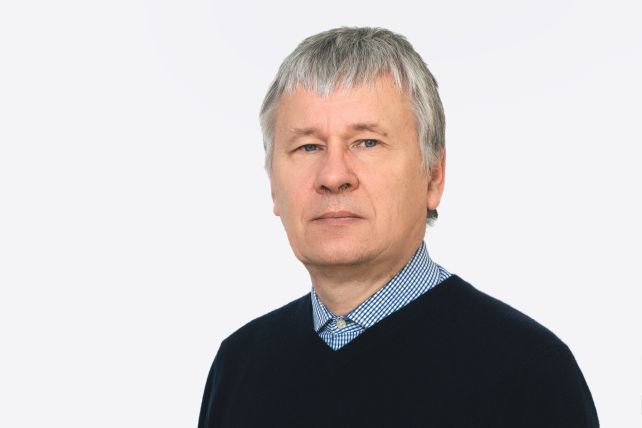
Professor Gediminas Gaigalas, Vilnius University, Faculty of Physics, Institute of Theoretical Physics and Astrophysics (ITPA), a world-leading researcher in theoretical atomic physics, has been awarded an honorary doctorate from the Faculty of Technology and Social Sciences, Malmö University.
"The scientific collaboration between my research group and my colleagues at Malmö University is currently intensifying, the range of problems we are working on is expanding, and this award will undoubtedly boost it even further. Although the news of the honorary doctorate came as a surprise and unexpected, when I think about the research I have carried out and the research I plan to carry out, I take this award not only as a personal recognition, but also as an international recognition of the research work of my research group, the Faculty of Physics of the ITPA, and the research work of Vilnius University," said Prof. G. Gaigalas.
The Malmö University News describes the professor as having scientific seriousness and enthusiasm, which inspires PhD students and colleagues.
“What distinguishes Gediminas Gaigalas as a researcher is his deep knowledge of his field and how incredibly dedicated he is,” says Per Jönsson, professor of applied mathematics and associate professor of physics at Malmö University.
Gaigalas has been collaborating closely with several researchers in atomic astrophysics at the Faculty of Technology and Society for over 30 years. Together, they have developed computational programs for atoms and ions that are used by a large number of research groups in laser physics, astrophysics, and nuclear physics.
"Malmö University, which has decided to award me an honorary doctorate, is a young, dynamic and fast-growing Swedish university. I have a long history of collaboration with my colleagues from this university. My first visit to this university took place from 12-16 February 2007, as I was working in the Department of Nature, Environment and Society with my long-standing colleague Professor Per Jönsson, whom I met at the 12th EGAS conference in Toruń, Poland, in 1991, when we were both young researchers and interested in each other's research, which we presented at the conference. The second time we met was during Per Jönsson's PhD thesis defence at Lund University in Sweden in January 1995. Since then, I have visited Malmö University many times as part of the Erasmus exchange programme and various projects, and each time I have seen how the University is becoming a modern, dynamically changing, interdisciplinary university that promotes international scientific cooperation and the implementation of new projects and ideas," said Prof. G. Gaigalas about the close cooperation.
“Our research in atomic astrophysics is based on combining experimental and calculated data for atoms and ions to analyse spectra from stars and gain knowledge about how, for example, superheavy elements are created in collisions between neutron stars. Professor Gaigalas and his research group have established themselves as leading experts in this field and we look forward to far-reaching collaborations,” adds Jönsson.
Prof. G. Gaigalas moksline veikla TFAI užsiima nuo 1982 m. Pagrindinės jo tyrimų sritys – daugiaelektronė atomo teorija ir šiuolaikinis atomo teorijos uždavinių modeliavimas remiantis įprastu ir simboliniu programavimu. Profesorius yra gausiai apdovanotas tiek Lietuvoje, tiek pasaulio mastu, o 2018 m. gavo VU rektoriaus mokslo premiją. Šiuo metu vadovauja TFAI Atomų struktūros skaičiavimų grupei.
Prof. G. Gaigalas has been working as a researcher at ITPA since 1982. His main areas of research are Multi-electron atomic theory, Spectroscopy and Modelling of contemporary atomic theory problems based on usual and symbolic programming.. He has received numerous awards both in Lithuania and worldwide, and in 2018 he received the VU Rector's Science Award. He is currently the head of the ITPA Atomic Structure Computation Group.


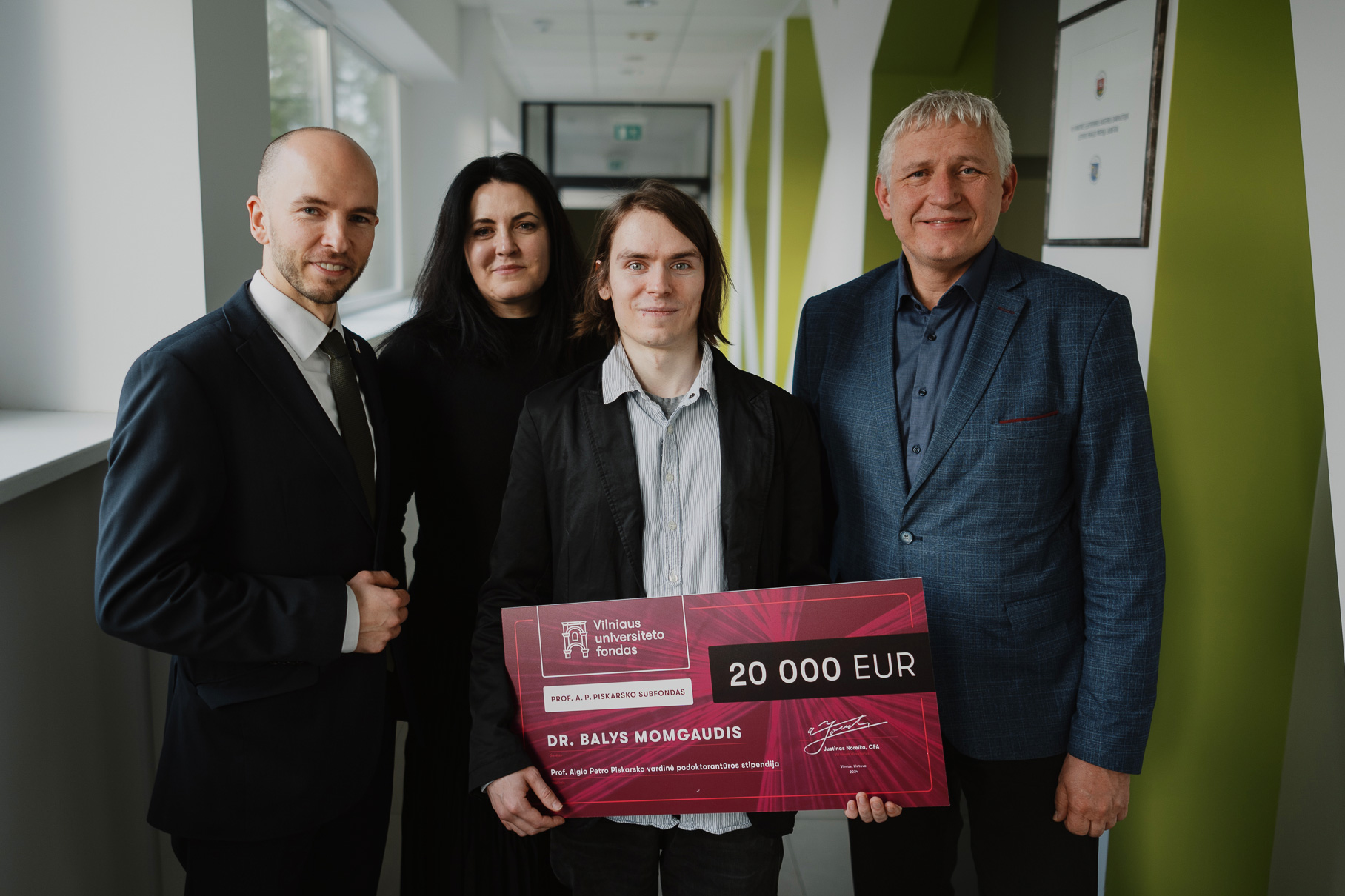
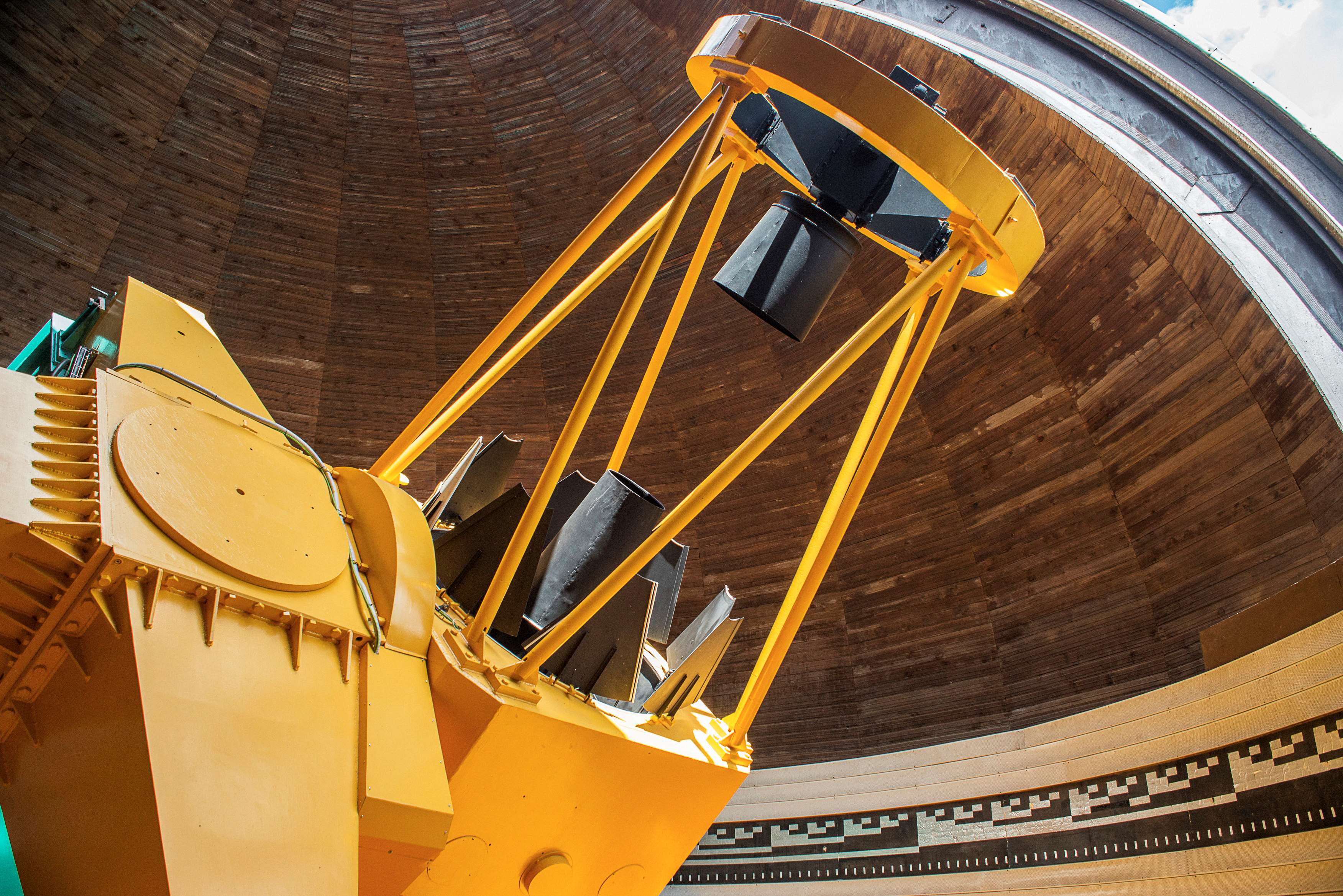



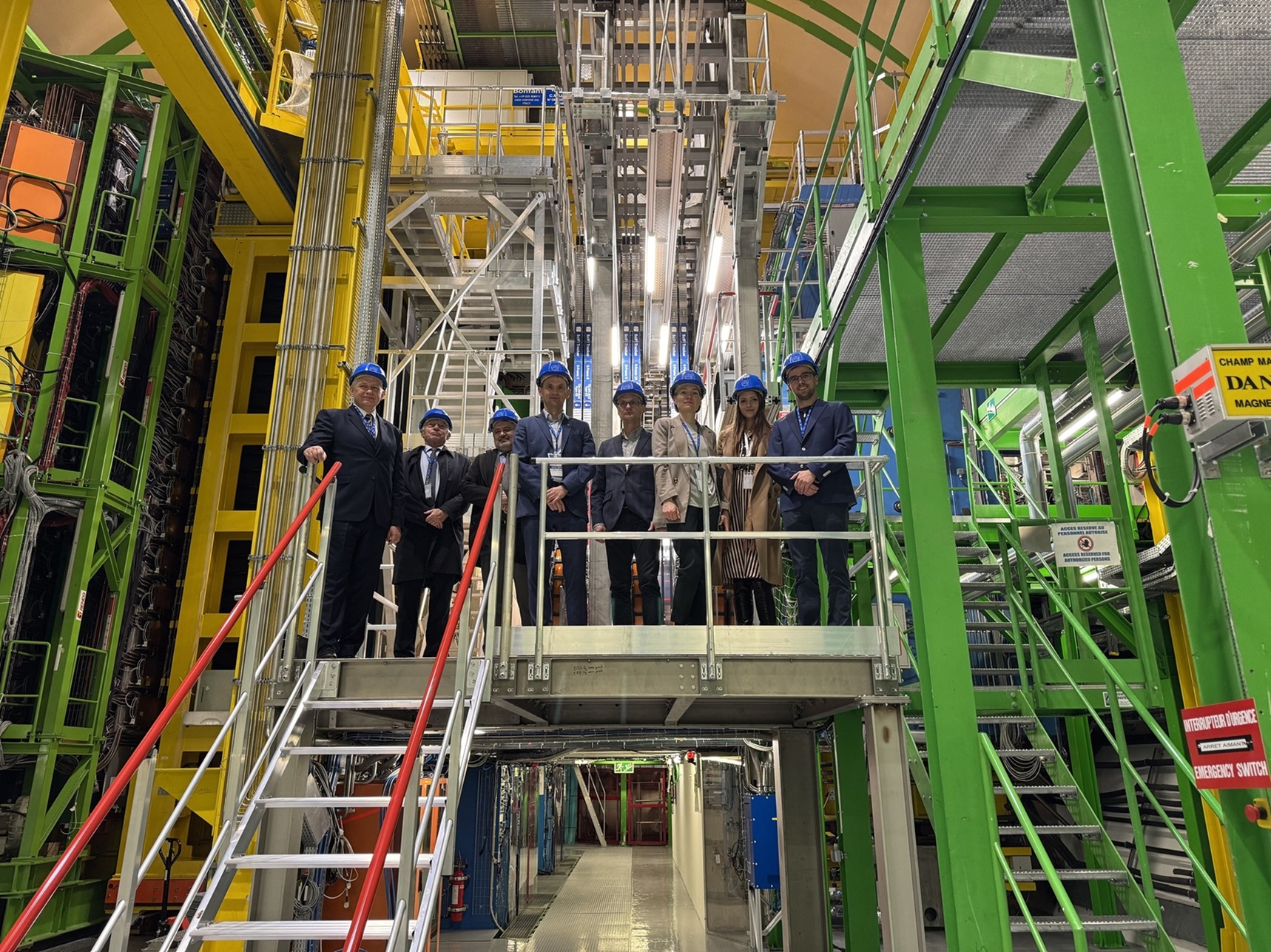
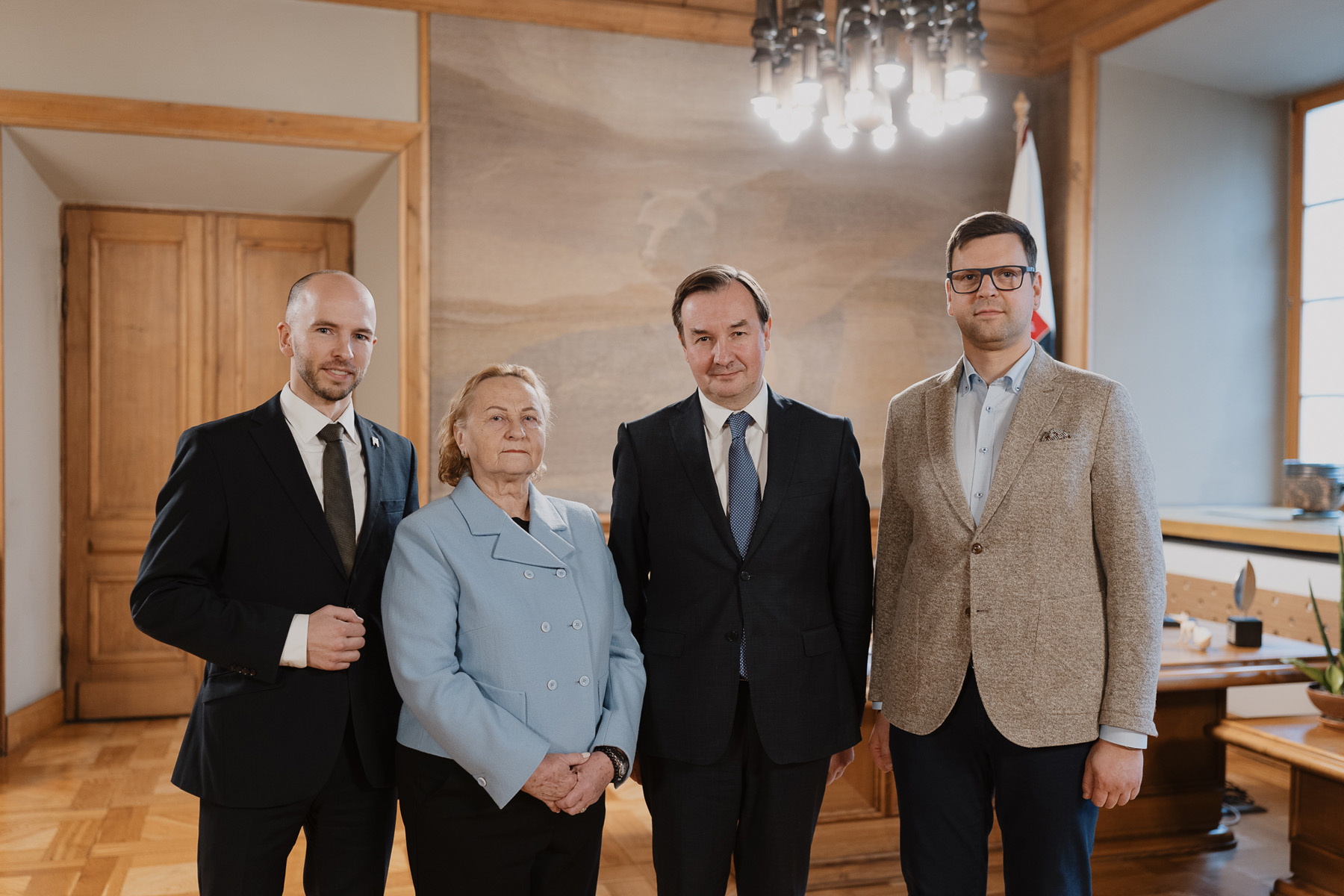

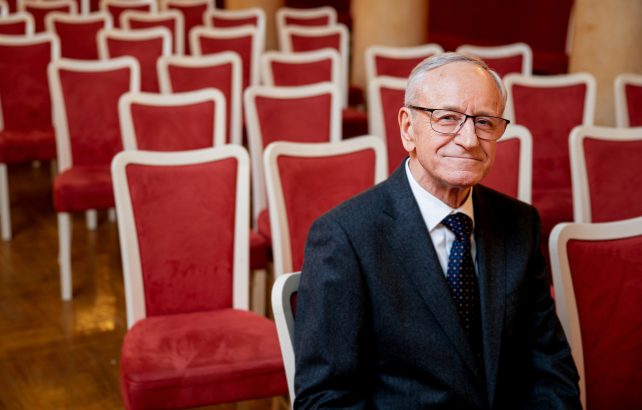
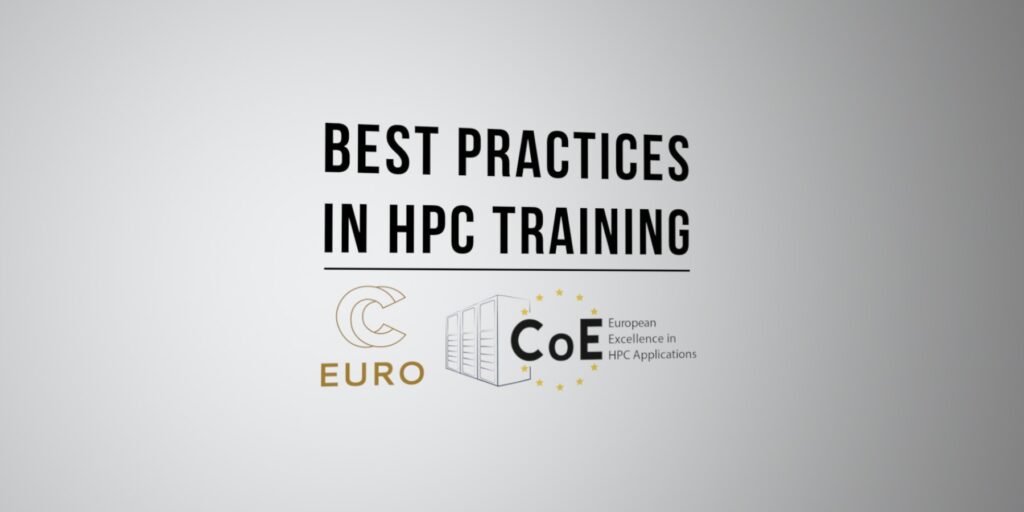

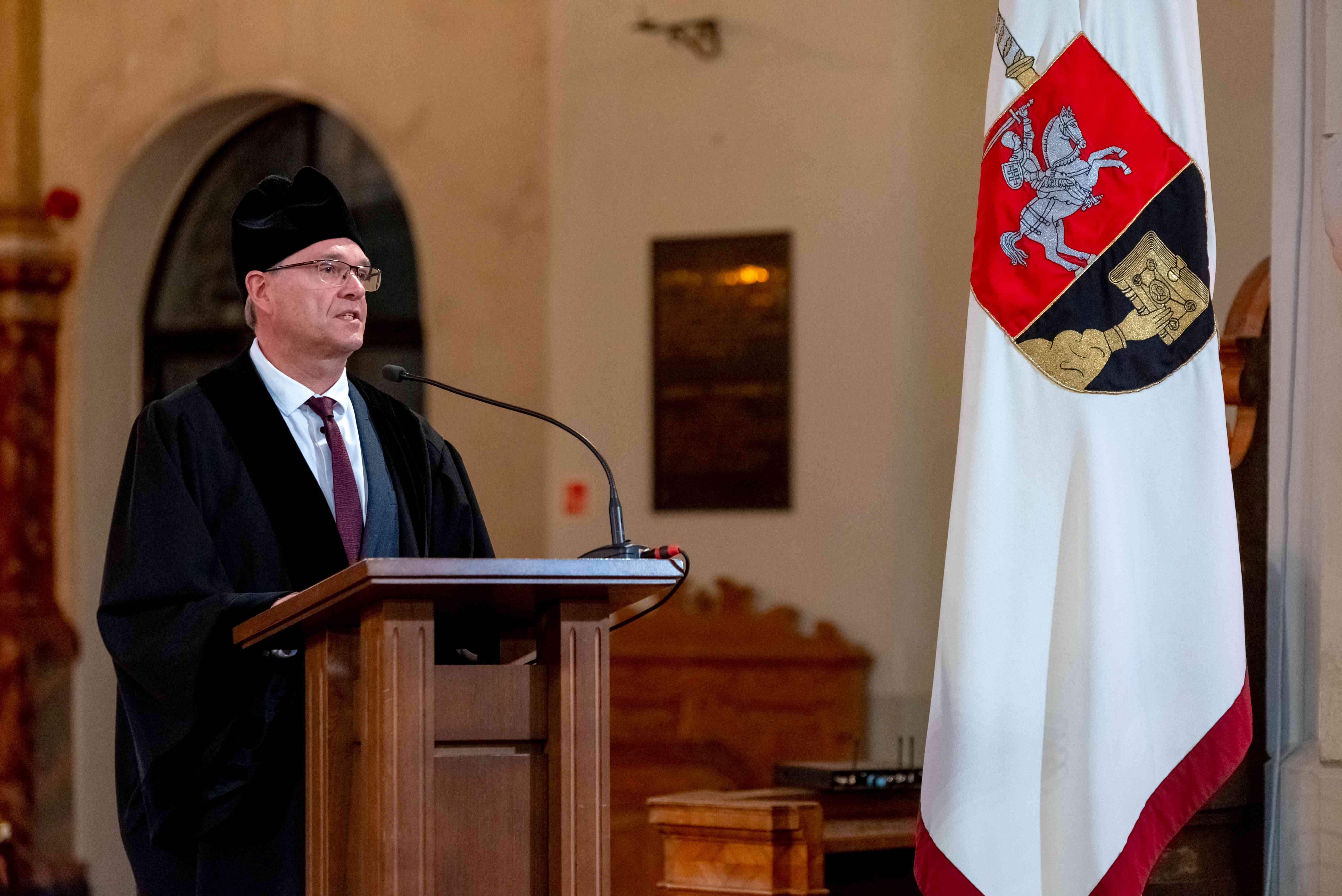
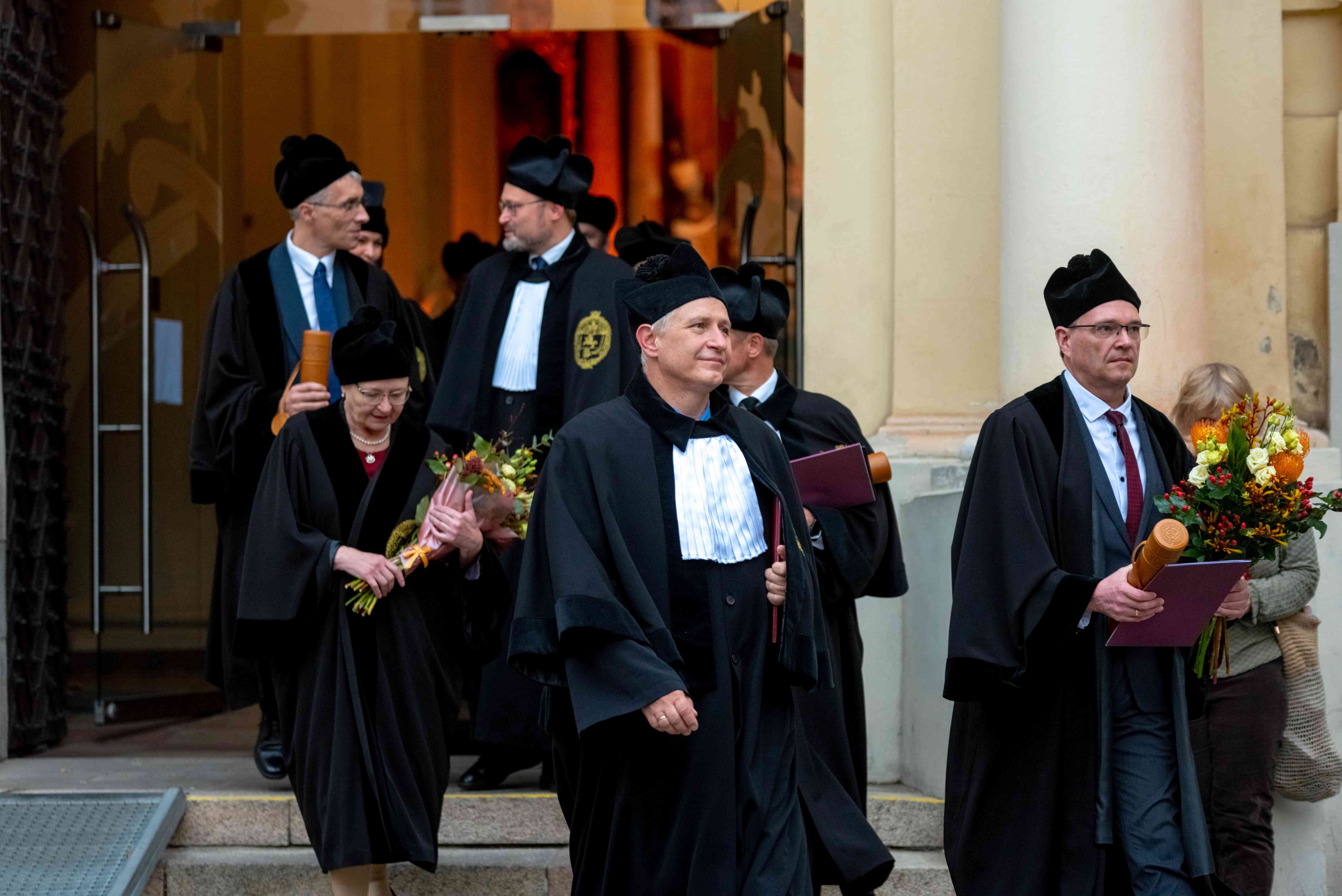

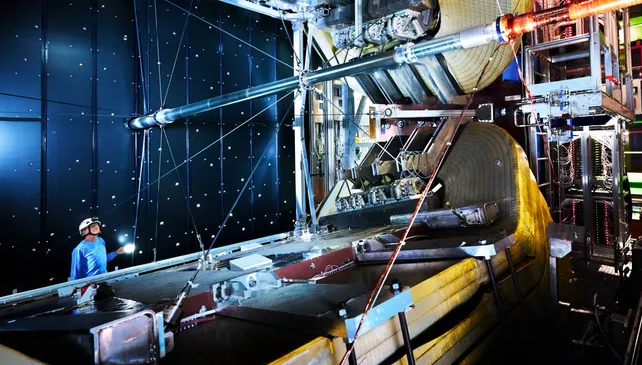 Vilnius University (VU) has received special recognition from the European Organization for Nuclear Research (CERN). On 2 September, by a unanimous decision of the LHCb Collaboration Board, VU became a new Institute of the prestigious LHCb experiment. This is a landmark achievement for the Lithuanian scientific community and an important step in enhancing the country’s engagement in international research projects.
Vilnius University (VU) has received special recognition from the European Organization for Nuclear Research (CERN). On 2 September, by a unanimous decision of the LHCb Collaboration Board, VU became a new Institute of the prestigious LHCb experiment. This is a landmark achievement for the Lithuanian scientific community and an important step in enhancing the country’s engagement in international research projects.
 This year, a prestigious European Research Council (ERC) grant was awarded to Prof. Mantas Šimėnas, a researcher from the Institute of Applied Electrodynamics and Telecommunications at the Faculty of Physics (FP) of Vilnius University (VU). His team will use the EUR 2.5 million Starting Grant, allocated for five years, to increase the sensitivity of electron paramagnetic resonance (EPR) spectroscopy.
According to Prof. Šimėnas, the aim of the winning project ‘Strongly Enhanced Sensitivity EPR through Bimodal Resonators and Quantum-Limited Amplifiers, Strong-ESPRESSO’ is to reduce the time required for EPR experiments by a factor of several thousand and to translate these improvements into the study of new systems: ‘EPR is a powerful tool used in a wide range of disciplines, including biology, chemistry, physics, materials science, and many others. It provides important and unique information about the material under study; however, the relatively low sensitivity of this method limits its use. For some critical materials, EPR studies can take up to a week, and, if even longer experiments are needed, we consider the system to be practically unmeasurable with EPR.’
The sensitivity has already been increased, new target – 5,000 times
In 2022, a Marie Skłodowska-Curie grant was awarded to the VU researcher, allowing the research team to improve the sensitivity of the EPR by a factor of several hundred. According to Prof. Šimėnas, the project is a natural but non-trivial extension, which is expected to shorten the time of EPR experiments by up to five thousand times.
‘Imagine that you used to spend a week measuring a protein system. Now, it would take about two minutes. This saves a huge amount of precious resources that can be used for even more research,’ says the scientist.
He asserts that the ERC funding scheme is essential for its prestige and practical benefits: ‘This generous grant is one of the most favourable in Europe. It allows the researcher and their team to stop worrying about costs and concentrate on their research. Of course, there’s a long road beforehand in terms of developing the research concept, completing the application, and, ultimately, performing well in the competition. However, the institutional support at the University motivates me,’ the interlocutor says.
Improvement can contribute to a better understanding of degenerative diseases
‘EPR is a spectroscopic research tool that allows us to study the spins of unpaired electrons. In nature, most electrons are paired, but there are some materials where the electron has no pair, i.e. its spin is not compensated. These so-called paramagnetic systems can be detected with EPR, providing beneficial, often unique information about the material under investigation – from proteins and catalysts to solid-state systems for quantum technologies,’ clarifies Prof. Šimėnas.
The researcher goes on to explain that the advantage of EPR is its selectivity. Most other methods observe the collective response of all the atoms in the material, but EPR can only focus on the atom with the unpaired electron. This selectivity allows specific protein sites to be examined and thus determine the structure of the protein.
‘Alongside other studies, we will also look at proteins involved in forming various neurodegenerative diseases such as Alzheimer’s and Parkinson’s. Therefore, improvements in the sensitivity of EPR study methods will allow us to significantly extend these studies, including protein systems that EPR cannot currently study,’ explains Prof. Šimėnas.
The project will also study new types of catalysts and various spin platforms for future quantum technologies.
Quantum and other complex technologies
‘In this project, we intend to borrow and adapt tools from the field of quantum technologies. One of them is a quantum-limited microwave amplifier with the minimum possible noise, as quantum mechanical processes limit the noise of such amplifiers. In general, EPR studies are hampered by thermal noise, which significantly increases the duration of experiments. We want to use these sophisticated amplifiers to improve EPR’s sensitivity drastically,’ says Prof. Šimėnas.
In this project, the researcher discusses his plan to use other sophisticated tools, such as a bimodal microwave resonator.
‘In EPR studies, we want to concentrate the microwaves where the sample is located – the microwave resonator does that. Conventional EPR resonators have a single mode – they resonate at a single frequency. Bimodal resonators have two modes: they may have the same frequency, but their fields are perpendicular in space, i.e. the two resonances do not interact. If we put a system of electron spins in such a resonator, it is through the spins that interaction is created between the two modes. In this way, we can use one mode to excite the spin system and the other to read the excitation of the spins, thereby isolating the detector from the loud thermal noise that comes with the excitation signal,’ Prof. Šimėnas says.
‘Among other innovations, we will use a millikelvin dilution refrigeration system to cool resonators and amplifiers. Millikelvin is close to the lowest possible temperature – almost absolute zero, at -273.15 °C. We will buy a special dilution fridge to reach these extreme temperatures. It will be the first in the region to open up a wide range of research and development opportunities for quantum technologies in Lithuania. It is great that our funding makes it possible to stop worrying about how and where to buy the sophisticated equipment needed for the research,’ says the VU researcher.
This year, Prof Patrick Pausch, a researcher from the Life Sciences Center (LSC) at VU, also received an ERC Starting Grant in Lithuania. The only other ERC Starting Grant to have previously been awarded to a researcher in Lithuania was to Dr Stephen Knox Jones from the LSC at VU. The 2024 ERC Starting Grant competition attracted 3,500 researchers from European Union Member States and the countries associated with Horizon Europe, 494 of whom were awarded funding. The grant won by Prof. Šimėnas is the first ERC grant awarded to VU FP.
This year, a prestigious European Research Council (ERC) grant was awarded to Prof. Mantas Šimėnas, a researcher from the Institute of Applied Electrodynamics and Telecommunications at the Faculty of Physics (FP) of Vilnius University (VU). His team will use the EUR 2.5 million Starting Grant, allocated for five years, to increase the sensitivity of electron paramagnetic resonance (EPR) spectroscopy.
According to Prof. Šimėnas, the aim of the winning project ‘Strongly Enhanced Sensitivity EPR through Bimodal Resonators and Quantum-Limited Amplifiers, Strong-ESPRESSO’ is to reduce the time required for EPR experiments by a factor of several thousand and to translate these improvements into the study of new systems: ‘EPR is a powerful tool used in a wide range of disciplines, including biology, chemistry, physics, materials science, and many others. It provides important and unique information about the material under study; however, the relatively low sensitivity of this method limits its use. For some critical materials, EPR studies can take up to a week, and, if even longer experiments are needed, we consider the system to be practically unmeasurable with EPR.’
The sensitivity has already been increased, new target – 5,000 times
In 2022, a Marie Skłodowska-Curie grant was awarded to the VU researcher, allowing the research team to improve the sensitivity of the EPR by a factor of several hundred. According to Prof. Šimėnas, the project is a natural but non-trivial extension, which is expected to shorten the time of EPR experiments by up to five thousand times.
‘Imagine that you used to spend a week measuring a protein system. Now, it would take about two minutes. This saves a huge amount of precious resources that can be used for even more research,’ says the scientist.
He asserts that the ERC funding scheme is essential for its prestige and practical benefits: ‘This generous grant is one of the most favourable in Europe. It allows the researcher and their team to stop worrying about costs and concentrate on their research. Of course, there’s a long road beforehand in terms of developing the research concept, completing the application, and, ultimately, performing well in the competition. However, the institutional support at the University motivates me,’ the interlocutor says.
Improvement can contribute to a better understanding of degenerative diseases
‘EPR is a spectroscopic research tool that allows us to study the spins of unpaired electrons. In nature, most electrons are paired, but there are some materials where the electron has no pair, i.e. its spin is not compensated. These so-called paramagnetic systems can be detected with EPR, providing beneficial, often unique information about the material under investigation – from proteins and catalysts to solid-state systems for quantum technologies,’ clarifies Prof. Šimėnas.
The researcher goes on to explain that the advantage of EPR is its selectivity. Most other methods observe the collective response of all the atoms in the material, but EPR can only focus on the atom with the unpaired electron. This selectivity allows specific protein sites to be examined and thus determine the structure of the protein.
‘Alongside other studies, we will also look at proteins involved in forming various neurodegenerative diseases such as Alzheimer’s and Parkinson’s. Therefore, improvements in the sensitivity of EPR study methods will allow us to significantly extend these studies, including protein systems that EPR cannot currently study,’ explains Prof. Šimėnas.
The project will also study new types of catalysts and various spin platforms for future quantum technologies.
Quantum and other complex technologies
‘In this project, we intend to borrow and adapt tools from the field of quantum technologies. One of them is a quantum-limited microwave amplifier with the minimum possible noise, as quantum mechanical processes limit the noise of such amplifiers. In general, EPR studies are hampered by thermal noise, which significantly increases the duration of experiments. We want to use these sophisticated amplifiers to improve EPR’s sensitivity drastically,’ says Prof. Šimėnas.
In this project, the researcher discusses his plan to use other sophisticated tools, such as a bimodal microwave resonator.
‘In EPR studies, we want to concentrate the microwaves where the sample is located – the microwave resonator does that. Conventional EPR resonators have a single mode – they resonate at a single frequency. Bimodal resonators have two modes: they may have the same frequency, but their fields are perpendicular in space, i.e. the two resonances do not interact. If we put a system of electron spins in such a resonator, it is through the spins that interaction is created between the two modes. In this way, we can use one mode to excite the spin system and the other to read the excitation of the spins, thereby isolating the detector from the loud thermal noise that comes with the excitation signal,’ Prof. Šimėnas says.
‘Among other innovations, we will use a millikelvin dilution refrigeration system to cool resonators and amplifiers. Millikelvin is close to the lowest possible temperature – almost absolute zero, at -273.15 °C. We will buy a special dilution fridge to reach these extreme temperatures. It will be the first in the region to open up a wide range of research and development opportunities for quantum technologies in Lithuania. It is great that our funding makes it possible to stop worrying about how and where to buy the sophisticated equipment needed for the research,’ says the VU researcher.
This year, Prof Patrick Pausch, a researcher from the Life Sciences Center (LSC) at VU, also received an ERC Starting Grant in Lithuania. The only other ERC Starting Grant to have previously been awarded to a researcher in Lithuania was to Dr Stephen Knox Jones from the LSC at VU. The 2024 ERC Starting Grant competition attracted 3,500 researchers from European Union Member States and the countries associated with Horizon Europe, 494 of whom were awarded funding. The grant won by Prof. Šimėnas is the first ERC grant awarded to VU FP.  Vilnius University researchers and partners from the National Taipei University of Technology (NTUT) are invited to apply for research projects in physics, chemistry, artificial intelligence and/or cyber security.
Vilnius University researchers and partners from the National Taipei University of Technology (NTUT) are invited to apply for research projects in physics, chemistry, artificial intelligence and/or cyber security.